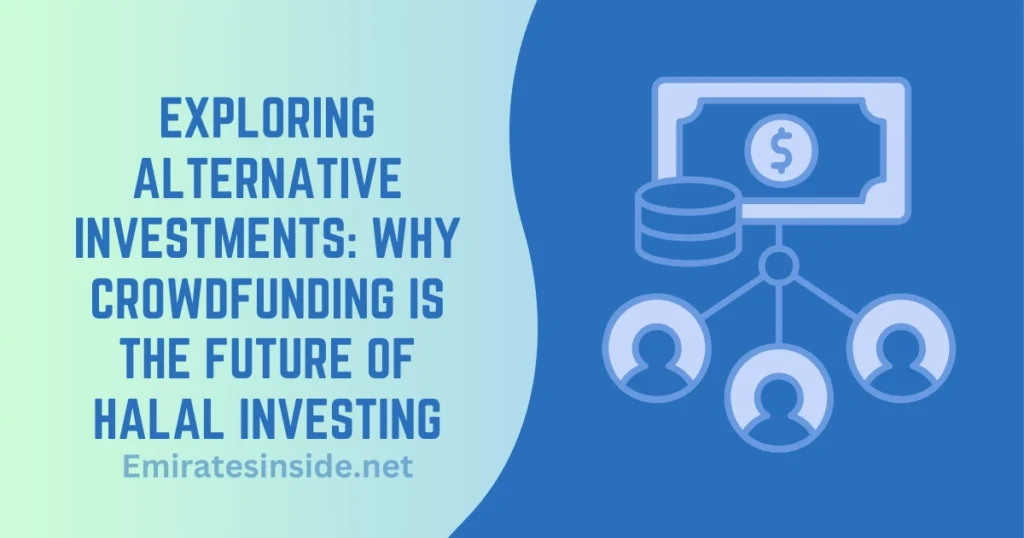Exploring Alternative Investments: Why Crowdfunding is the Future of Halal Investing
The world of investing has evolved dramatically over the past decade. Investors are no longer limited to traditional investment methods like stocks, bonds, and real estate. One of the most promising and rapidly growing investment avenues is crowdfunding, especially in the context of Shariah-compliant (Halal) investments. In this article, we will explore why crowdfunding is becoming the future of Halal investing and how it is reshaping the investment landscape in the UAE and beyond.

What is Crowdfunding in Investment?.
Crowdfunding is a method of raising capital for a project, business, or venture by collecting small amounts of money from a large number of people, typically via online platforms. This method democratizes the investment process, making it accessible to a wider range of investors. In traditional investing, capital typically comes from a few large investors or institutional investors, but crowdfunding allows for the pooling of resources from multiple individual contributors.
There are different types of crowdfunding, such as reward-based (where investors receive rewards instead of financial returns), equity-based (where investors receive equity in the company they invest in), and debt-based (where investors lend money to the business or project in exchange for interest payments). In the context of Shariah-compliant crowdfunding, the debt-based and equity-based models are most relevant.
Why Crowdfunding Is the Future of Halal Investing
1. Shariah Compliance in Crowdfunding Models
Traditional investment models often conflict with Islamic principles, particularly with the practice of earning interest (Riba), which is prohibited in Islam. Many conventional financial products involve interest-based loans or speculative activities that are considered non-compliant with Shariah law.
Crowdfunding, on the other hand, offers Shariah-compliant alternatives. Equity-based crowdfunding, for example, involves investing in a company by purchasing shares or ownership in the business. This method is compliant with Islamic principles, as investors share in the profits and losses of the business, rather than receiving fixed interest payments.
In debt-based crowdfunding, Shariah-compliant models avoid interest (Riba) by structuring loans in a way that complies with Islamic finance principles, often by incorporating profit-sharing arrangements such as Murabaha, Mudarabah, or Musharakah. These structures allow investors to receive returns based on the performance of the business, rather than on a predetermined interest rate.
By leveraging these compliant structures, crowdfunding platforms are able to offer ethical investment opportunities that align with Islamic finance principles, providing Muslim investors with an avenue to invest in a Halal and transparent manner.
2. Accessibility and Low Entry Barriers
One of the primary advantages of crowdfunding is its accessibility. Traditional investment methods often require large capital to get started. In real estate, for example, investors need substantial amounts of money for down payments and fees. Similarly, buying stocks or bonds requires access to stock markets and brokers, which might be out of reach for many people.
Crowdfunding breaks down these barriers by allowing smaller investments from individual investors. In Halal crowdfunding, you can start investing with as little as a few hundred or thousand dirhams. This low entry point democratizes access to investment opportunities, making it easier for middle-class investors in the UAE and the broader GCC region to participate.
This level of accessibility appeals to a wider range of investors who might not have previously had the means to enter traditional investment markets. It empowers Muslims to align their investments with their faith-based values while benefiting from the returns on their investment.
3. Diversification and Risk Management
Diversification is a crucial aspect of any successful investment strategy. In traditional investment markets, investors are often limited to a narrow range of asset classes or products. In contrast, crowdfunding platforms offer access to a wide variety of investment opportunities, from real estate to startups, technology ventures, and even renewable energy projects.
For Muslim investors, this presents an exciting opportunity to diversify their portfolios with Shariah-compliant options, spreading risk across various sectors. By investing in multiple projects, investors can mitigate potential losses from any single investment, enhancing the overall stability of their portfolios.
Additionally, many crowdfunding platforms offer diverse geographic coverage, meaning investors can participate in projects in various regions and industries, further broadening their investment horizon. The ability to diversify across different asset classes, industries, and geographies helps mitigate the risks associated with relying on a single type of investment.
4. Transparent Investment Process
Transparency is a critical factor in gaining the trust of investors, particularly in Shariah-compliant investing. Islamic finance places a significant emphasis on the ethical conduct of investments and the transparency of business dealings. Investors must have clear visibility into how their money is being used and the risks involved.
Crowdfunding platforms, especially Halal platforms, are known for their high levels of transparency. They provide detailed information about the projects they fund, the teams behind them, and how funds will be allocated. This level of openness is crucial for investors looking to ensure that their funds are being used ethically and in accordance with Islamic principles.
For example, investors can typically access detailed project proposals, financial projections, and updates on the progress of the venture. This transparency ensures that investors are fully aware of where their money is going, which aligns with the Islamic finance requirement for clear, honest transactions.
5. Real-Time Monitoring and Direct Impact
Unlike traditional investments, where investors may have limited interaction with the companies or projects they fund, crowdfunding platforms often offer investors real-time updates and the ability to track the performance of their investments directly.
This is particularly important for Shariah-compliant investors who want to ensure that their money is being used appropriately, following the ethical guidelines laid out in Islamic finance. Many platforms offer dashboards where investors can monitor the progress of the funded projects, see the returns generated, and track whether the investment is performing as expected.
Moreover, crowdfunding platforms often allow investors to contribute directly to causes and projects they believe in, giving them a sense of involvement and purpose. This direct engagement can increase the sense of satisfaction for investors who are not only seeking financial returns but also want to make an impact in areas aligned with their values.
6. Growth of the Halal Investment Market
The demand for Halal investment options is growing rapidly, especially in the UAE and GCC. As more people seek to invest in ethical, faith-aligned ventures, the market for Shariah-compliant investments continues to expand.
Crowdfunding offers a unique opportunity to tap into this growing market, as platforms become increasingly specialized in providing Halal investment opportunities. Platforms like Funding Souq are leading the charge in offering regulated, low-risk, and high-return investment options for Muslim investors. The increasing interest in crowdfunding as a tool for Halal investing will only continue to rise as the industry matures and more investors recognize its potential.






